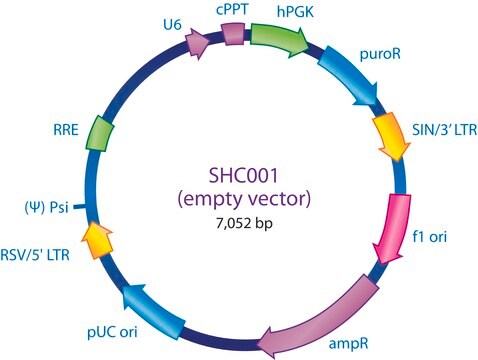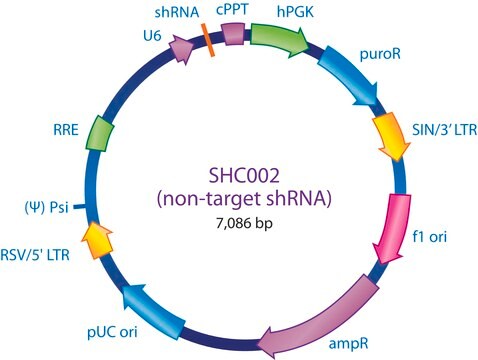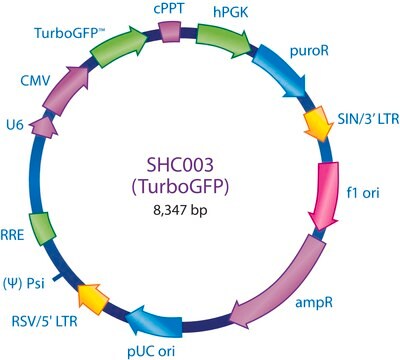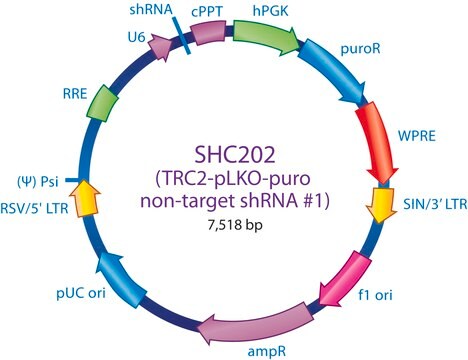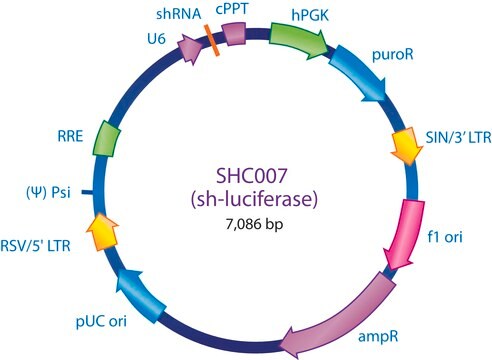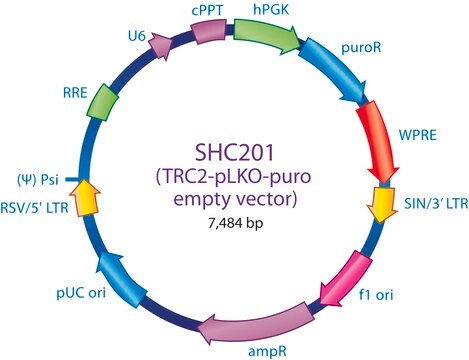SHC002
MISSION® pLKO.1-puro Non-Mammalian shRNA Control Plasmid DNA
Targets no known mammalian genes
Synonym(s):
MISSION® Control Vectors
Sign Into View Organizational & Contract Pricing
All Photos(1)
About This Item
Recommended Products
Quality Level
product line
MISSION®
concentration
500 ng/μL in TE buffer; DNA (10μg of plasmid DNA)
shipped in
dry ice
storage temp.
−20°C
Looking for similar products? Visit Product Comparison Guide
Related Categories
Application
MISSION® pLKO.1-puro non-mammalian shRNA control plasmid DNA has been used:
- to transduce RLE-6TN cells
- for the validation of Oct4-green fluorescent protein (GFP) mouse embryonic fibroblasts (MEFs)
- as a negative control for RNA knockdown
MISSION®pLKO.1-puro Non-Mammalian shRNA Control Plasmid DNA has been used:
- for the knockdown of transmembrane prostate androgen-induced RNA (TMEPAI)
- in the infection mixture for lentivirus preparation
- for generating the puromycin-resistant ST14A (rat striatal neuronal cell line) cell populations
- to induce Ago2 (argonaute-2) down-regulation
Legal Information
Use of this product is subject to one or more license agreements. For details, please see http://sigmaaldrich.com/missionlicense.
MISSION is a registered trademark of Merck KGaA, Darmstadt, Germany
recommended
Product No.
Description
Pricing
Storage Class Code
12 - Non Combustible Liquids
WGK
WGK 1
Flash Point(F)
Not applicable
Flash Point(C)
Not applicable
Personal Protective Equipment
dust mask type N95 (US), Eyeshields, Gloves
Choose from one of the most recent versions:
Certificates of Analysis (COA)
Lot/Batch Number
Sorry, we don't have COAs for this product available online at this time.
If you need assistance, please contact Customer Support.
Already Own This Product?
Find documentation for the products that you have recently purchased in the Document Library.
Customers Also Viewed
TMEPAI/PMEPA 1 enhances tumorigenic activities in lung cancer cells
Vo Nguyen TT, et al.
Cancer Science, 105(3), 334-341 (2014)
JNK1 Deficient Insulin-Producing Cells Are Protected against Interleukin-1?-Induced Apoptosis Associated with Abrogated Myc Expression.
Prause M
Journal of Diabetes Research (2016)
SFPQ?NONO and XLF function separately and together to promote DNA double-strand break repair via canonical nonhomologous end joining.
Jaafar l
Nucleic Acids Research, 45(4), 1848-1859 (2017)
TRIM28 is an Epigenetic Barrier to Induced Pluripotent Stem Cell Reprogramming.
Miles DC
Stem Cells (2017)
Platelet-independent adhesion of calcium-loaded erythrocytes to von Willebrand factor.
Smeets MW
PLoS ONE, 12.3 (2017)
Our team of scientists has experience in all areas of research including Life Science, Material Science, Chemical Synthesis, Chromatography, Analytical and many others.
Contact Technical Service